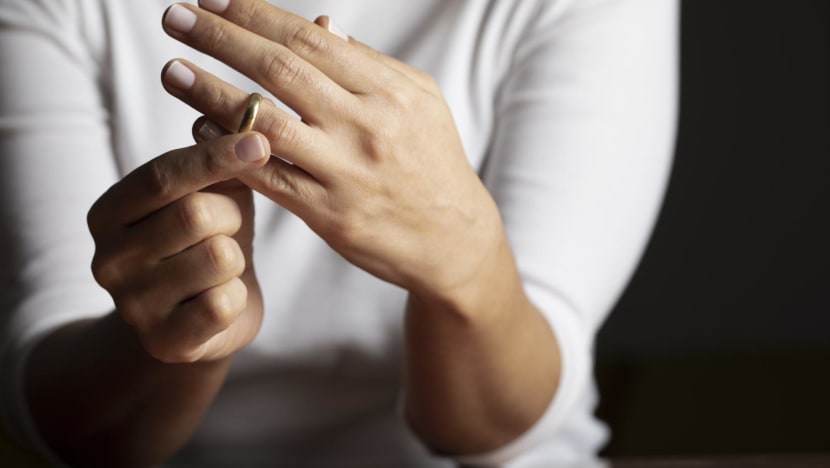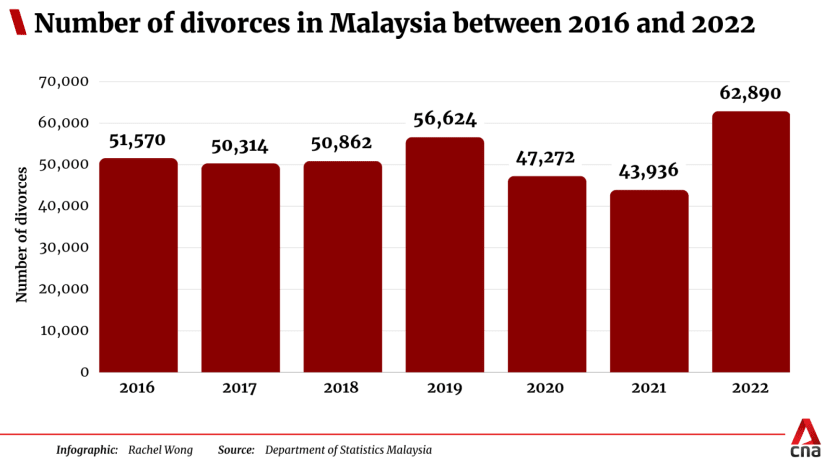43% spike in Malaysia’s divorce cases last year due to effects of COVID-19 lockdown, experts say
One divorce lawyer whom CNA spoke to said that the “modern” attitude of the younger generation plays a role, noting that such couples make up most of her clientele seeking a divorce.


This audio is generated by an AI tool.
SINGAPORE: A spike in divorce cases in Malaysia last year - where figures rose to 62,890 from 43,936 in 2021 - could largely be attributed to the effects of the lockdown during the COVID-19 pandemic, lawyers told CNA.
Despite the spike, one expert said that the rise in cases may not be all bad, as it points to greater awareness of mental health in relationships.
Figures released on Thursday (Nov 23) by the Department of Statistics Malaysia (DOSM) showed that divorce cases rose by 43.1 per cent in 2022 as compared to the year before, with Muslim divorces making up the majority.
Of the 62,890 divorce cases recorded in 2022, 46,138 cases involved Muslim couples. This was a 45.8 per cent increase from the year before, noted DOSM chief statistician Uzir Mahidin.
There was also a 36.4 per cent jump in the number of non-Muslim divorces - from 12,286 cases in 2021 to 16,752 cases in 2022.
Lawyers whom CNA spoke to said factors such as the prevalence of social media, greater empowerment among women as well as a “modern” way of thinking were also possible factors leading to the uptick in the number of divorces in the country.
One also noted that for Muslims, problems arising from polygamous marriages may have contributed to the rise in divorce cases in the community.

ROLE OF THE COVID-19 PANDEMIC
Mr Jerald Gomez, a lawyer at Jerald Gomez & Associates, told CNA that the high divorce rates could be attributed to the effects of the COVID-19 pandemic.
He noted that the lockdown - known as the Movement Control Order (MCO) - during the pandemic forced couples to spend time together in close proximity without any breaks.
The MCO was introduced in March 2020 and ran until December 2021.
The arrangement thus prevented couples from having the space to reflect or destress on their own outside of each other’s company, he said.
“(The lockdown) went on for almost two years which brought out a lot of differences in opinions, philosophies, management of finances and (also brought) each other’s behaviour under stress to the fore,” said Mr Gomez.
He noted that the pandemic also added a financial strain to relationships.
“This added to the pressure of having to support each other and (led to them) scrutinising each other’s financial contribution,” he told CNA.
Ms Goh Siu Lin, a partner at Kee Sern, Siu & Huey, noted that the increase in domestic violence during the COVID-19 pandemic could also have contributed towards the higher divorce rates.
“There are statistics from the Women's Aid Organisation (WAO) (that address how) domestic violence spiked during the MCO period,” she said, adding how an increasing perception that it is not shameful to leave an unhappy or toxic marriage could have spurred some to push for divorce.
WAO is a local non-governmental organisation (NGO) that provides support to women and children experiencing abuse.
According to the organisation, it saw a 44 per cent increase in calls to its hotline and enquiries on Whatsapp in March 2020 when the lockdown was imposed.
Ms Goh added that the sharp rise in divorces could also be due to a backlog of cases being cleared.
“Although the courts were still operating (during the pandemic), they were (doing so) at a lower capacity. And so it could be that a backlog is being cleared once the pandemic has lifted,” she said.
The DOSM chief statistician noted in his statement that the 45.8 per cent increase in Muslim divorces in 2022 was due to “cases that were carried forward from the previous year”.
MUSLIM MARRIAGES: POLYGAMY AND THE THREE “TALAK”
Lawyers told CNA that Muslim women who may have been mistreated in polygamous marriages may decide that a divorce would be the best course of action.
In Malaysia, polygamy is allowed for Muslims and permission must be granted by the Shariah courts.
“Some men (in a polygamous marriage) may not really invest time, energy and effort into the first or second wife when there is a third and fourth to look after.
“In those kind of scenarios, the older wives may not want to tolerate it anymore (and seek) other options such as being independent. They know their rights and they seek a share of the assets or maintenance,” Ms Goh told CNA.
She added that she has handled cases where the second wife is made to be the “wealth generator” while the husband does not not contribute to the marriage.
“I see sometimes the husband ‘goyang kaki’ (idles) and the wives are the ones looking after the house and working because they have to put food on the table and put the kids through school. And these wives are sometimes abused physically, sexually and emotionally,” said Ms Goh.
“So these women (decide that) this is not acceptable and say ‘I would rather be independent and be free of all this abuse’ than to be in an unhappy and abusive marriage.”
Sisters In Islam - a local civil organisation which promotes women’s rights within the framework of Islam - noted in its 2021 findings that the top concern raised by women in a polygamous marriage was that their husbands did not provide them any maintenance.
Data gathered from the organisation’s legal clinic also found that the second most recurring issue was that their husbands had entered a polygamous marriage without their permission, followed by unregistered polygamy.
Mr Gomez noted that in civil marriages, couples can only seek a divorce after two years of marriage. Meanwhile, Muslim men are allowed to declare the “talak” three times for an immediate divorce.
The utterance of the word "talak", which means to release or untie in Arabic, is a method of divorce recognised by the Shariah court, though Islamic law varies from state to state. In the east coast state of Terengganu, for example, the declaration of the "talak" must be made thrice in court for the divorce to be recognised.
Ms Jazzmine Khoo, a managing partner at Jazzmine Khoo & Associates, also noted the quick process for a Muslim divorce.
“A Muslim (couple) … can get a divorce done within a short amount of time - a few hours only or less than that. (Meanwhile), a non-Muslim divorce would still need a few months to get done,” she said.
OTHER FACTORS
Beyond that, general issues such as social media or online platforms, and the attitude of the younger generation towards marriage were also factors leading to the uptick in the number of divorces in Malaysia.
Mr Gomez pointed out that “social media (has been) … the main means of escapism for anyone under pressure or stress”.
“The access to Facebook, Tinder, TikTok, Instagram and Whatsapp are examples (that allow) married couples to communicate with third parties privately and provides avenues for them to get to know strangers or acquaintances,” he said.
He added that the married individual stepping out on their marriage may compare that person with their spouse.
Mr Gomez also noted that the “self-absorbed” attitude of the younger generation has played a role towards mounting divorce cases in the country.
“Today’s generation of younger couples were blessed with the financial support of both the government and their parents, opportunities and most of the comforts of life … Their paramount goal is to enjoy oneself, to always be in a happy state.
“From our experience, younger couples divorce at the first sign of trouble or discomfort. Some even within two years of marriage,” he said.
Ms Khoo added that the “modern” attitude of the younger generation plays a role, noting that younger couples make up most of her clients seeking a divorce.
“This is because younger couples are forward thinking or modern in thinking. They decide fast and do not want to waste their future,” she said.
“In comparison, older couples have more patience and some may still hold a bad perception regarding divorce. They tend to stay in their marriage and try for reconciliation.”
BEYOND THE BAD OF DIVORCE
Ms Khoo noted that the rise in divorces may not necessarily be a bad thing.
“Mental health awareness is (becoming more widespread) and I think the public are more alert that a healthy mental state comes from multiple factors and one of it is by having a healthy relationship,” she said.
Meanwhile, Ms Goh said that more resources must be placed in the judicial system to facilitate divorces.
She noted the importance of an approach known as the collaborative law process - a family or child-focused approach - that emphasises a commitment to assist the family achieve a tailored solution with the help of a family coach, instead of going to court.
She added that it is crucial for the government or agencies to ensure a family-centred justice system like in Singapore.
“That requires the government to equip the judiciary (financially). (There also needs to be) on-site mediation professionals so that we can intervene at an early stage before the conflict escalates or becomes worse,” said Ms Goh, adding that resources are needed to break up inter-generational trauma which could lead to a pattern of divorce or unhealthy relationships through generations.



















